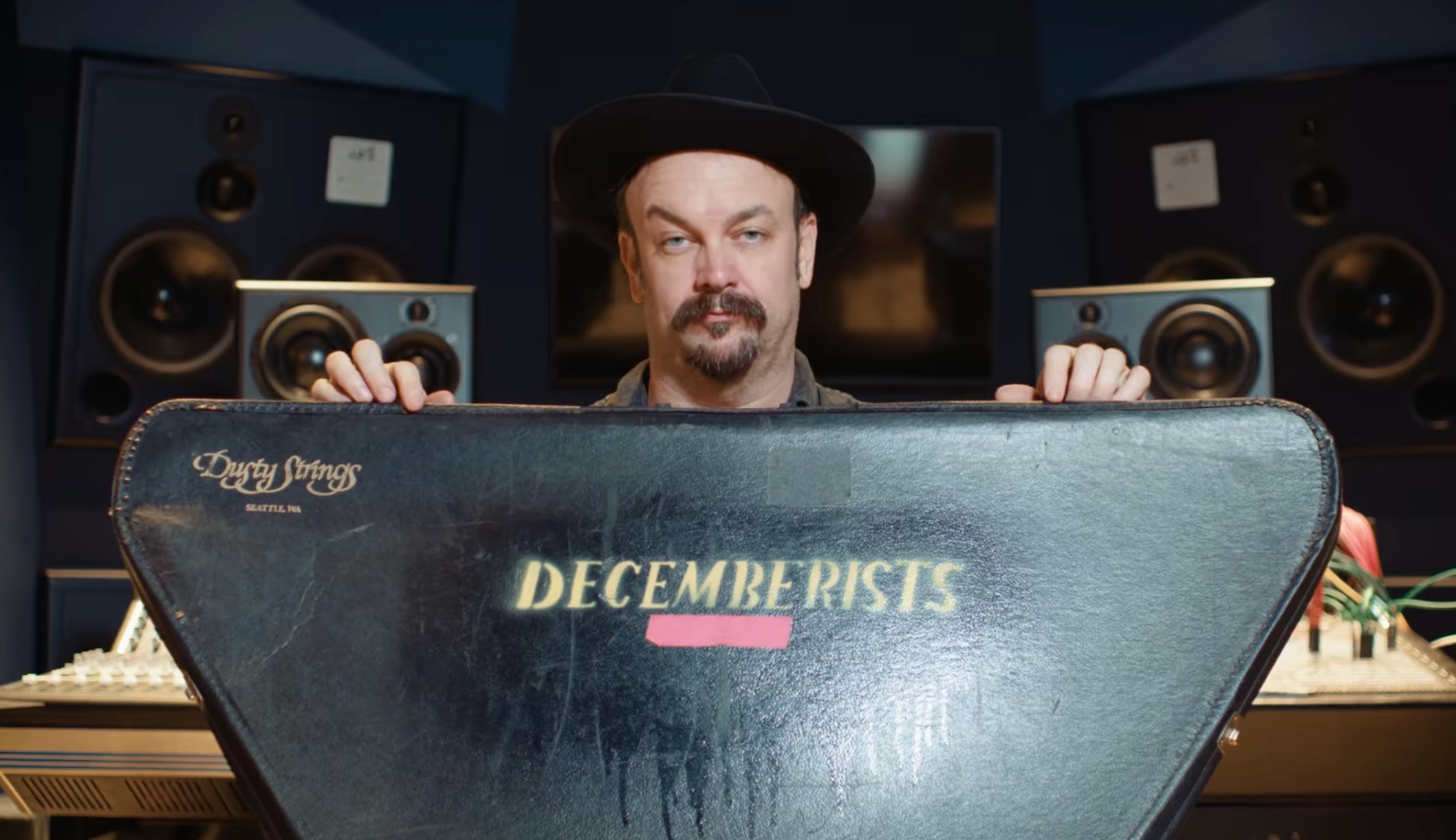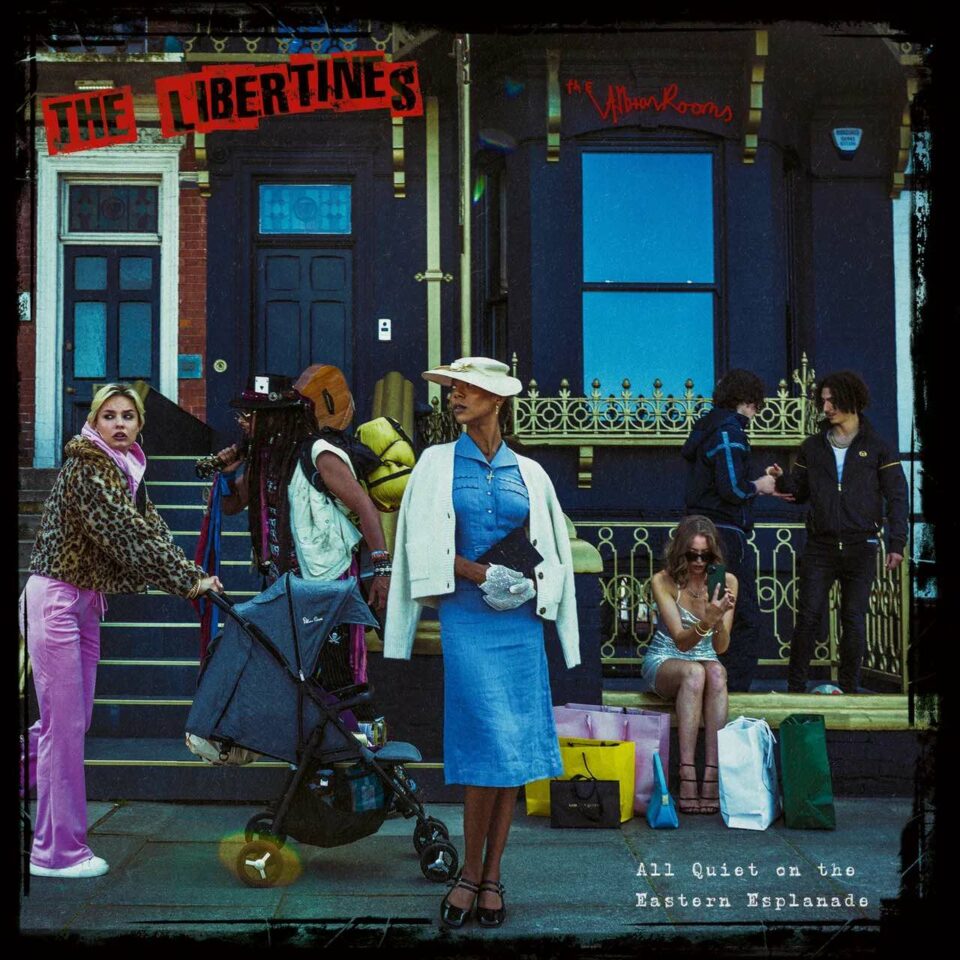At some point during the past two years, Chris Funk, the veteran multi-instrumentalist of The Decemberists, reached a point where he had to start minimizing—or at the very least diverting—his time on the Internet reading headlines and scrolling through his social media newsfeeds. Funk, who is best known on stage for his large frame, scruffy facial hair, and wide-brimmed fedora, says this act of informational flagellation has become “a pastime that we all do now—a habit that’s part of [our] lives.”
He goes on: “I was trying to frame that part of my life with something more positive and find stories—people sharing experiences of success and happiness and overcoming difficulty in a positive way, as opposed to the constant barrage of negativity in the world right now.”
During his search, Funk stumbled upon Great Big Story, a media site dedicated to capturing offbeat and unusual people, places, culture, and history through a unique style of ambitious mini-documentaries. “I was really drawn to how [well-made] the Great Big Story’s shorts were,” says Funk. “They did as their name espouses, telling huge stories about people, [but] in a short amount of time.” After watching a feature on Beverly Watkins, an Atlanta blues guitarist in her late seventies, Funk reached out to the site to see how he could get a hold of Watkins and ask if she’d be interested in playing a stage he was curating for the Newport Folk Festival. During his conversations with Great Big Story, however, the company’s vice president of content, Courtney Coupe, proposed the idea of collaborating with Funk on his own hosted series.
The resulting Funk Plus One sees Funk traveling the country, meeting and interviewing some of music’s overlooked and unacknowledged characters, from Dean Shostak, one of only a handful of individuals that still plays the glass armonica, to Kip Winger, a former hair metal rock star who reinvented himself as a classical composer. As he gears up to release the upcoming eighth Decemberists album, I’ll Be Your Girl, we caught up with Funk to talk about the series.
How did you conceptualize the series before it began? Did that change at all throughout the process?
We knew it would be about music and people doing something interesting in music. And we just kind of went off and started shooting. We didn’t really know what it was until we started. We took an approach of what Errol Morris would do, which is an interview off camera getting the artist to speak. And we found that worked really well. We found the artists really loosened up because I always bring an instrument with me and start playing music with them. Whether or not they knew my band or knew who I was, they just sort of felt a commonality with me that allowed them to speak from the heart, which I think you can feel—at least, the producers tell me that to make me feel better about myself. [Laughs.]
Funk Plus One’s first season is focused on six particularly unique people. How did you find these artists?
Being a fan of music, I guess. I don’t know. Probably the same way you digest music—through the Internet or festivals. [For instance,] “Blind Boy” Paxton I had seen at a festival we played in Australia. I’m kind of just constantly consuming music. And these days, if you allow yourself, you can get bombarded with it all the time, which is great. Some of it came through my interest in physical instruments. Dean Shostak, who plays the glass armonica—that was more just researching people who played unusual instruments. He popped up and I threw his name in the hat.
The thing is, once you dig into it, you have to ask yourself: How interesting is their story? Do they have a story to tell? A guitar player who’s sitting in their room just trying to learn Eddie Van Halen’s dexterous skill… You’re probably not going to get the best interview. We really looked for someone who has something else going on in his or her life. They all feel different to me.
Take Leabert Lindsey, the paniolo Hawaiian cowboy. His story is really about his culture and his work. He’s really the first folk musician I’ve ever met who actually did what they were singing about. We have so many people in the idiom of folk music playing bluegrass who aren’t coal miners. It was like, “Wow, this guy actually gets on the horse and does what he’s singing about.” It’s amazing.
Gaelynn Lea’s story is obviously so interesting and fascinating. [Ed. note: Lea is a singer/violinist who was born with Osteogenesis Imperfecta, a disorder of the bones and limbs.] And she’s such an amazing person. Just her personality is amazing. She’s lovely. And her music’s fantastic. And Kip Winger [might have] had the most inspired story of them all: someone who has rewritten their own story just following their creative passion, which I think is so admirable. Him using a moment of tragedy to really go for it and realize how short [a time] we get to walk around this planet—and how we should seize at least a couple times a week what our heart draws us to and not be worried about where we came from.
What has been the most rewarding aspect of meeting these people and learning about them?
“Musicians all sort of suffer the same doubts about what we’re doing and we all can’t realize our successes all the time. But we’re never going to stop doing it.”
Realizing that we—we being musicians—all sort of suffer the same doubts about what we’re doing and we all can’t realize our successes all the time. But we’re never going to stop doing it. Because we’re all addicted to it. It reasserts my addiction to music and makes it OK. We’re all enabling each other. It’s just cool to see through different lenses and different experiences, but they’re all pretty much the same. No matter what level you’re touring or how many people come to your concerts, we’re all in the same boat, sharing the same struggle of how to make a living and do it gracefully and make art and make something that you’re satisfied with, and balance that with a life of wandering creativity.
How do you reconcile that all the time? I find that fascinating. You don’t ever really talk out loud about the bad stuff in your life or what’s the difficult part of touring as a musician or the difficult part of trying to record a song or feel inspired. What are the hard parts? The good parts and the parts that look easy are when an album gets released. The good parts are when the reviews are favorable. The good parts are when the concerts sell out. But what are the difficult parts? And therefore, why do we go back to the art of it? What is it? Selfishly, it sort of returns me to the well of inspiration. My interactions with my contemporaries playing in an indie rock band where we’re all backstage at festivals celebrating, you don’t really get the chance to really engage and chat about how your experience really is. So it’s cool to have an objective conversation with musicians that you don’t know at all.
It’s kind of like having these mini–therapy sessions. It’s funny how often we open up with seemingly complete strangers.
People aren’t having conversations anymore. They’re just saying what they want to say and then they just go back to their dark corner. I think it’s really important to sit face-to-face with people and have a shared discussion. It gives you perspective. It’s just perspective for me, some narcissistic reaffirmation of why I need to be in a band. Shared perspective is really nice. Finding commonality, that’s what makes us feel great about the world.
Is this something you could see yourself continuing to do in the foreseeable future? Should we expect a second season of Funk Plus One?
Absolutely. By the time we hit the interview in Hawaii with Leabert Lindsey, the paniolo cowboy, that’s when it became clear to me what this series could become. I really enjoy it. I’m inspired by it. And I love to travel and investigate culture and music on a deeper level, if that can in fact be extracted from the experience. How music is influencing culture in a region is really interesting. It doesn’t always, but that’s where my head goes. FL









